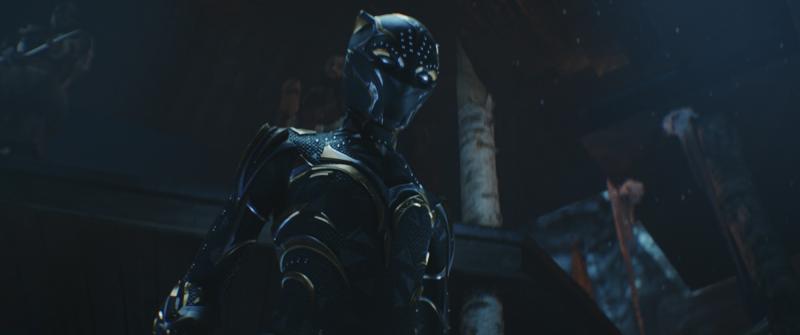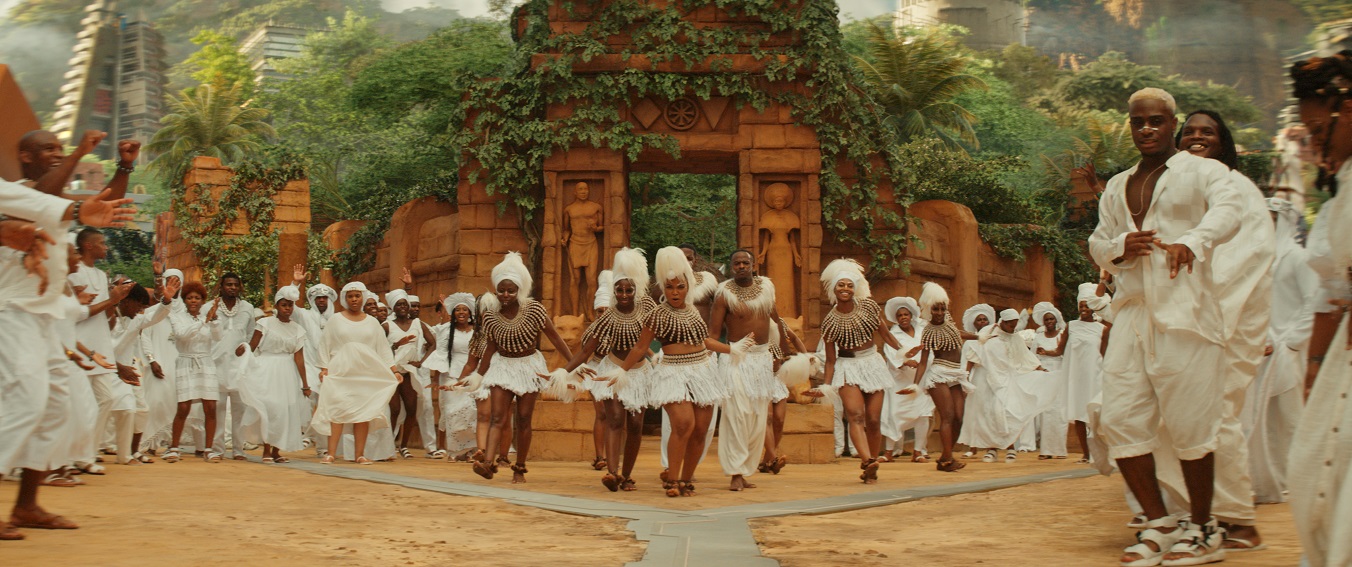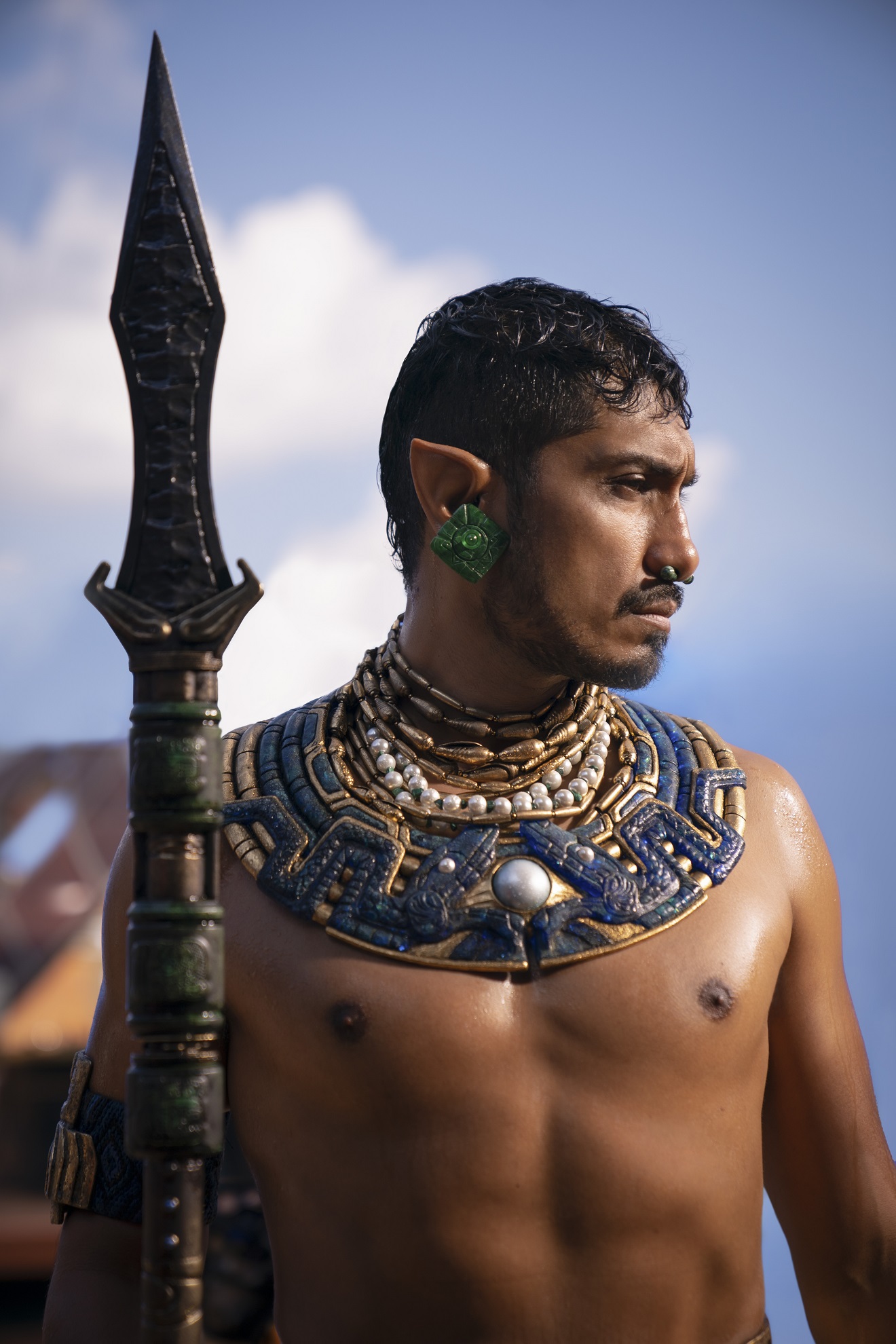Black Panther: Wakanda Forever review - expanded Afro-dreams survive a star's death | reviews, news & interviews
Black Panther: Wakanda Forever review - expanded Afro-dreams survive a star's death
Black Panther: Wakanda Forever review - expanded Afro-dreams survive a star's death
Ryan Coogler honours Chadwick Boseman with a new Black Panther and renewed, radical brief

Chadwick Boseman’s T’Challa dies off-screen of an undisclosed disease, suffering “in silence” notes sister Shuri (Letitia Wright), actor and role as one at the end. Lost after one, uniquely iconic full-length film, recasting and digital resurrection was rejected by shocked writer-director Ryan Coogler, even as he ripped his sequel script up.
Mourning is intermittent in Black Panther: Wakanda Forever, with a ghost-wind whistling over a Marvel Studios emblem given over to Boseman. The strength of Coogler’s initial Afrofuturist vision is shown by T’Challa’s funeral, led by white-robed women dancing to Ludwig Göransson’s exhilarating polyrhythmic score, in a procession encompassing a jungle hut and ascent to a science-fiction ship, rooted tradition and technological potency.
Wakanda’s golden mist-shrouded hills’ force-field protection is similarly parted by water-drum signals, while Hannah Beachler’s production design offers wooden-strutted, gleaming tower blocks spanning centuries and civilisations. In short order, Okoye (Danai Gurira) and her elite female squad dispatch French soldiers trying to steal the kingdom’s Vibranium power source, and grieving Queen Mother Ramona (Angela Bassett) has torn a strip off Western UN leaders from a position of invincible power. At which point you may catch your breath at Coogler’s ongoing upending of Africa and blackness’s whole Hollywood existence. Wakanda and T’Challa’s creation by two middle-aged Jewish-American geniuses, Stan Lee and Jack Kirby, shows his consistency with Marvel’s founding Sixties philosophy. Coogler weaves an expanded, anti-colonial philosophy into Wakanda Forever’s fabric by recasting his anti-hero antagonist Namor, the Sub-Mariner (Tenoch Huerta, pictured below), from undersea Atlantean king to ruler of a submerged Mayan civilisation, Talokan, forced into the water by conquistador genocide, where they survive thanks to their own Vibranium stash. They later re-emerge from the ocean to raze a Spanish slave plantation – a shared, atrocious African and Indigenous history in the Americas – suggesting Toussaint’s bloody Haiti revolution. This confirms Talokan and Wakanda as a combined, fantasised rising of a repressed, colonised global subconscious, coherently underpinning a blockbuster which retains its quota of (unusually emotional) superhero punch-ups.
Coogler weaves an expanded, anti-colonial philosophy into Wakanda Forever’s fabric by recasting his anti-hero antagonist Namor, the Sub-Mariner (Tenoch Huerta, pictured below), from undersea Atlantean king to ruler of a submerged Mayan civilisation, Talokan, forced into the water by conquistador genocide, where they survive thanks to their own Vibranium stash. They later re-emerge from the ocean to raze a Spanish slave plantation – a shared, atrocious African and Indigenous history in the Americas – suggesting Toussaint’s bloody Haiti revolution. This confirms Talokan and Wakanda as a combined, fantasised rising of a repressed, colonised global subconscious, coherently underpinning a blockbuster which retains its quota of (unusually emotional) superhero punch-ups.
Tenoch Huerta’s star-making, soulful performance recalls Boseman’s charisma, making Namor sensitive and headstrong, intimately soft-spoken and a fearsome warrior; his faithfully retained ankle-wings (and green trunks) seem daft then pretty in their soft flutter. He begins his defence of Talokan’s Vibranium with an assault by hypnotic siren-song suicide and super-strong slaughter on a US undersea mining rig. Namor wants a Wakanda alliance against the “developed” world and its inevitable tendency to despoil their previously protected kingdoms.
 This leads both parties to Massachusetts’ Ivy League MIT (“The equivalent of one of our village schools,” Okoye sniffs), where teenage super-student Riri Williams (Dominique Thorne) has cooked up both Vibranium-detecting gear and an Iron Man-style suit, using barely explained dosh (Riri’s own Ironheart TV series is forthcoming). In the ensuing mayhem, Shuri is kidnapped by Namor, who charmingly pursues his diplomatic offensive in Talokan, till fatalities cause him to wreak watery havoc on Wakanda.
This leads both parties to Massachusetts’ Ivy League MIT (“The equivalent of one of our village schools,” Okoye sniffs), where teenage super-student Riri Williams (Dominique Thorne) has cooked up both Vibranium-detecting gear and an Iron Man-style suit, using barely explained dosh (Riri’s own Ironheart TV series is forthcoming). In the ensuing mayhem, Shuri is kidnapped by Namor, who charmingly pursues his diplomatic offensive in Talokan, till fatalities cause him to wreak watery havoc on Wakanda.
Shuri’s evolution from grief-stricken scientist to avenging inheritor of her brother’s Black Panther mantle is Coogler’s last, convincing strand, leading to a final, desperate struggle with Namor which seems tragically misplaced. Wakanda’s nearly all-female warrior front-line feels incidental amidst a rush of progressive choices, but continues a significant, inspirational pop-culture shift.
Black Panther: Wakanda Forever stands alone as much as any Marvel movie can from the underwhelming aftermath of Avengers: Endgame, whose byzantine, exponentially expanding dimensions mirror Marvel Comics’ decadent decline. It feels authored by Coogler, combining a popular, approachably light touch with a radical and emotional heart. It’s also a very long, forced reset needed to introduce another Black Panther, deteriorating in retrospect, despite its convincing, feminist Afro-dreaming. The latter remains the true marvel.
rating
Explore topics
Share this article
The future of Arts Journalism
You can stop theartsdesk.com closing!
We urgently need financing to survive. Our fundraising drive has thus far raised £49,000 but we need to reach £100,000 or we will be forced to close. Please contribute here: https://gofund.me/c3f6033d
And if you can forward this information to anyone who might assist, we’d be grateful.

Subscribe to theartsdesk.com
Thank you for continuing to read our work on theartsdesk.com. For unlimited access to every article in its entirety, including our archive of more than 15,000 pieces, we're asking for £5 per month or £40 per year. We feel it's a very good deal, and hope you do too.
To take a subscription now simply click here.
And if you're looking for that extra gift for a friend or family member, why not treat them to a theartsdesk.com gift subscription?
more Film
 Urchin review - superb homeless drama
Frank Dillane gives a star-making turn in Harris Dickinson’s impressive directorial debut
Urchin review - superb homeless drama
Frank Dillane gives a star-making turn in Harris Dickinson’s impressive directorial debut
 Mr Blake at Your Service review - John Malkovich in unlikely role as an English butler
Weird comedy directed by novelist Gilles Legardinier
Mr Blake at Your Service review - John Malkovich in unlikely role as an English butler
Weird comedy directed by novelist Gilles Legardinier
 Don't Let's Go to the Dogs Tonight review - vivid adaptation of a memoir about a Rhodesian childhood
Embeth Davidtz delivers an impressive directing debut and an exceptional child star
Don't Let's Go to the Dogs Tonight review - vivid adaptation of a memoir about a Rhodesian childhood
Embeth Davidtz delivers an impressive directing debut and an exceptional child star
 One Battle After Another review - Paul Thomas Anderson satirises America's culture wars
Leonardo DiCaprio, Teyana Taylor, and Sean Penn star in a rollercoasting political thriller
One Battle After Another review - Paul Thomas Anderson satirises America's culture wars
Leonardo DiCaprio, Teyana Taylor, and Sean Penn star in a rollercoasting political thriller
 Steve review - educator in crisis
Cillian Murphy excels as a troubled headmaster working with delinquent boys
Steve review - educator in crisis
Cillian Murphy excels as a troubled headmaster working with delinquent boys
 Can I get a Witness? review - time to die before you get old
Ann Marie Fleming directs Sandra Oh in dystopian fantasy that fails to ignite
Can I get a Witness? review - time to die before you get old
Ann Marie Fleming directs Sandra Oh in dystopian fantasy that fails to ignite
 Happyend review - the kids are never alright
In this futuristic blackboard jungle everything is a bit too manicured
Happyend review - the kids are never alright
In this futuristic blackboard jungle everything is a bit too manicured
 Robert Redford (1936-2025)
The star was more admired within the screen trade than by the critics
Robert Redford (1936-2025)
The star was more admired within the screen trade than by the critics
 Blu-ray: The Sons of Great Bear
DEFA's first 'Red Western': a revisionist take on colonial expansion
Blu-ray: The Sons of Great Bear
DEFA's first 'Red Western': a revisionist take on colonial expansion
 Spinal Tap II: The End Continues review - comedy rock band fails to revive past glories
Belated satirical sequel runs out of gas
Spinal Tap II: The End Continues review - comedy rock band fails to revive past glories
Belated satirical sequel runs out of gas

Add comment